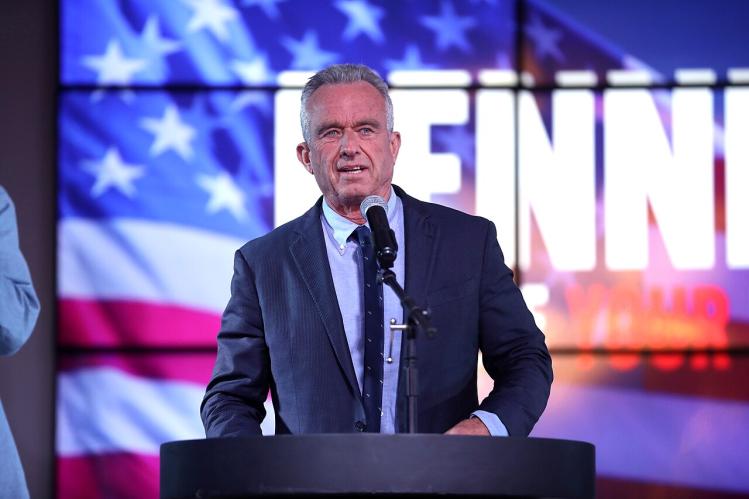
“It’s time we put a Kennedy back in the White House,” says Robert F. Kennedy Jr., the seventy-year-old nephew of the only Kennedy to have served as president. Why now, sixty-four years after the election of John F. Kennedy, and why him? The independent candidate offers no direct answer: his campaign appeals to nostalgia and is motivated by a sense of dynastic entitlement. “It would be my good fortune if I could play an important or heroic role” in American life, he wrote in a 2018 memoir. No doubt it would. The question is why the country should help him realize his grandiose aspirations.
Kennedy speaks from both the left and the right in anti-establishment terms. He promises to restore “the broad prosperity of the Eisenhower and JFK era” by raising the federal minimum wage, protecting the right to unionize, and cutting the price of prescription drugs. He wants to unwind both the military-industrial complex and “the censorship-industrial complex,” while sealing the border to “save cities from the crippling migrant crisis.” A noted environmentalist, he nonetheless accuses the Biden administration of imposing “totalitarian controls” in addressing climate change. His paranoid style is on fuller display in fundraising emails. “The will of the people is being thwarted by corruption and cronyism from Secretary Mayorkas and the Biden administration…. [T]hey want me out of this race at any cost and are refusing me Secret Service protection.” “During the pandemic…[the government] trampled on the remaining pillars of the First Amendment, curbing freedom of worship by closing down churches and synagogues without scientific rationale or democratic procedure.” Kennedy has said he’ll review the convictions of January 6 insurrectionists. In 2021, he called Anthony Fauci the most despotic doctor in human history. (Perhaps he has forgotten about Haiti’s François [Papa Doc] Duvalier, the physician/tyrant who murdered an estimated sixty thousand political enemies, was excommunicated by the Catholic Church, and claimed responsibility for JFK’s assassination by having placed a curse on him.)
Apart from his family tree and checkered personal history, Kennedy is widely known for spreading misinformation about vaccines—including the long-discredited theory that they cause autism. As president, Donald Trump thought of appointing him to lead a “vaccine safety and scientific integrity commission.” It makes sense, Fintan O’Toole recently wrote, that Kennedy and Trump are effectively in alliance: their populist, anti-establishment rhetoric appeals to a sizable group of disaffected voters across the political spectrum. Kennedy has repeatedly gotten into trouble—and apologized—for statements that echo Trumpian positions a little too loudly. He’s also gotten into trouble with members of the extended Kennedy clan, who have chastised him for trading on the family name while taking stances at odds with their own political principles, and who have endorsed Joe Biden. The larger worry among Democrats is that Kennedy will pull more votes from the president than from Trump.
In selecting tech entrepreneur Nicole Shanahan as his running mate, Kennedy has access to the wealth she brings to the campaign (she helped pay for the Super Bowl ad that repurposed JFK’s famous 1960 spot). Kennedy faces the immediate problem of getting on the ballot in fifty states. As of this writing, he was seeking to run as a Libertarian. It would be an odd fit, but RFK Jr. is an odd man with odd beliefs. His ambitions are far more likely to return not another Kennedy to the White House, but the most corrupt and authoritarian president this nation has ever known. In that case, RFK Jr. would certainly have played a historic role—but not a heroic one.
